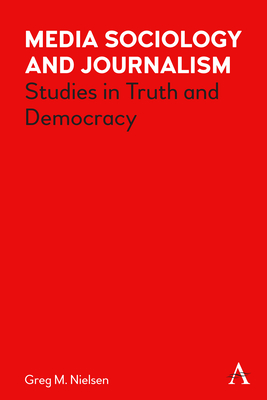Media Sociology and Journalism: Studies in Truth and Democracy

Media Sociology and Journalism: Studies in Truth and Democracy
Media Sociology and Journalism is a dialogue on the kind of society we find ourselves in as defined through news media and politics, and as seen in contemporary sociological theory. As we work through opposing visions of the global pandemic and an economic depression as well as solutions to racial reckoning, we need to remember we are navigating inside a political and media storm that has raged around the world since the unexpected results of the 2016 U.S election and Brexit Referendum. Deregulation, climate change, forced migrations, and inequality are only some of the topics on which opposing alt right, progressives, and moderates are divided. Journalism, politics and contemporary sociological theory are examined through their interplay and respective strengths and weaknesses in assessing the tenacity of the many deeply opposing claims where each side takes the other's "truth" to be an existential threat.
The relation between truth and democracy as a regime of power and type of society has always been fragile, often tenuous, and even irrelevant at times. We are nonetheless in a moment where journalists, politicians and social scientists are continually perplexed as to what to do with the denial of basic facts they are expected to trust in order to help create democracy. Post-truth attitudes, the rise of authoritarianism, fake news, conspiracy theories, neoliberalism, nihilism, white nationalism are all threats to democracy but so are repetitive mainstream journalistic narrative strategies that exclude subaltern subjects they report on as the first audience they imagine in writing reports and opinions. Case studies of immigration, urban poverty, and regulating cultural and religious difference are selected to show patterns of hospitality, conditional tolerance or recognition that journalists frame for audiences in ways that help define the public dialogue on welcoming, acceptance, or rejection of others.
A dialogical critique of the gaps between how social actors are represented in journalism, politics and sociology versus how they might see themselves is the first step toward an alternative way of creating democratic society.
PRP: 1079.83 Lei
Acesta este Pretul Recomandat de Producator. Pretul de vanzare al produsului este afisat mai jos.
971.85Lei
971.85Lei
1079.83 LeiLivrare in 2-4 saptamani
Descrierea produsului
Media Sociology and Journalism is a dialogue on the kind of society we find ourselves in as defined through news media and politics, and as seen in contemporary sociological theory. As we work through opposing visions of the global pandemic and an economic depression as well as solutions to racial reckoning, we need to remember we are navigating inside a political and media storm that has raged around the world since the unexpected results of the 2016 U.S election and Brexit Referendum. Deregulation, climate change, forced migrations, and inequality are only some of the topics on which opposing alt right, progressives, and moderates are divided. Journalism, politics and contemporary sociological theory are examined through their interplay and respective strengths and weaknesses in assessing the tenacity of the many deeply opposing claims where each side takes the other's "truth" to be an existential threat.
The relation between truth and democracy as a regime of power and type of society has always been fragile, often tenuous, and even irrelevant at times. We are nonetheless in a moment where journalists, politicians and social scientists are continually perplexed as to what to do with the denial of basic facts they are expected to trust in order to help create democracy. Post-truth attitudes, the rise of authoritarianism, fake news, conspiracy theories, neoliberalism, nihilism, white nationalism are all threats to democracy but so are repetitive mainstream journalistic narrative strategies that exclude subaltern subjects they report on as the first audience they imagine in writing reports and opinions. Case studies of immigration, urban poverty, and regulating cultural and religious difference are selected to show patterns of hospitality, conditional tolerance or recognition that journalists frame for audiences in ways that help define the public dialogue on welcoming, acceptance, or rejection of others.
A dialogical critique of the gaps between how social actors are represented in journalism, politics and sociology versus how they might see themselves is the first step toward an alternative way of creating democratic society.
Detaliile produsului








